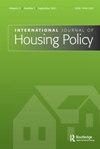Forced housing mobility and mental wellbeing: evidence from Australia
IF 2.6
2区 经济学
Q3 ENVIRONMENTAL STUDIES
引用次数: 3
Abstract
Abstract This article examines the links between forced housing mobility and the mental wellbeing of Australians in an era of heightened risks in both labour and housing markets. Specifically, we examine how the links between forced housing mobility and mental wellbeing may vary according to states of employment and housing tenure insecurity. Using the 2001–2018 Household, Income and Labour Dynamics in Australia Survey, we implement hybrid models across four mental wellbeing dimensions and uncover three key findings. First, there is strong evidence that forced moves impair mental wellbeing. Second, the adverse wellbeing impacts of forced moves are greater for those experiencing employment insecurity than those in secure employment. Third, forced moves can depress the wellbeing of both owner purchasers and private renters, but the wellbeing penalty is greater in the case of the former. Overall, our analysis emphasises the importance of harnessing housing as a policy instrument for promoting wellbeing. Our findings also highlight the need for policies that mitigate loss of home ownership and reforms that improve tenure security for renters.强迫住房流动性和心理健康:来自澳大利亚的证据
本文探讨了在劳动力和住房市场风险加剧的时代,强迫住房流动性和澳大利亚人的心理健康之间的联系。具体而言,我们研究了强迫住房流动性和心理健康之间的联系如何根据就业状况和住房使用权不安全状况而变化。利用2001-2018年澳大利亚家庭、收入和劳动力动态调查,我们在四个心理健康维度上实施了混合模型,并发现了三个关键发现。首先,有强有力的证据表明,强迫运动损害心理健康。其次,对于那些就业不安全的人来说,被迫搬迁对健康的不利影响要大于那些有稳定就业的人。第三,强制搬迁可能会抑制自有购房者和私人租房者的福祉,但前者的福祉惩罚更大。总的来说,我们的分析强调了利用住房作为促进福祉的政策工具的重要性。我们的研究结果还强调,需要制定政策,减轻房屋所有权的丧失,并进行改革,提高租房者的租赁保障。
本文章由计算机程序翻译,如有差异,请以英文原文为准。
求助全文
约1分钟内获得全文
求助全文
来源期刊

International Journal of Housing Policy
Multiple-
CiteScore
5.80
自引率
14.30%
发文量
42
期刊介绍:
The International Journal of Housing Policy aims to be the leading forum for the critical analysis of housing policy, systems and practice from a social science perspective. It is published quartely. We welcome articles based on policy-relevant research and analysis focused on all parts of the world. We especially encourage papers that contribute to comparative housing analysis, but articles on national or sub-national housing systems are also welcome if they contain data, arguments or policy implications that are relevant to an international audience.
 求助内容:
求助内容: 应助结果提醒方式:
应助结果提醒方式:


